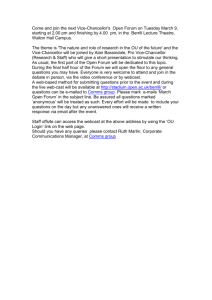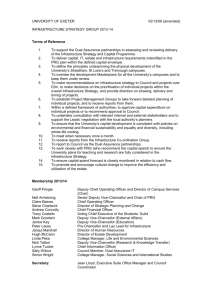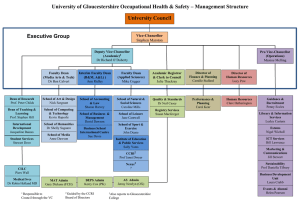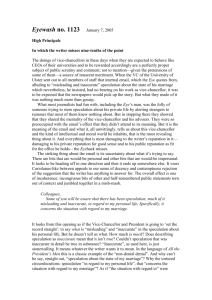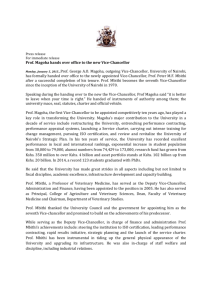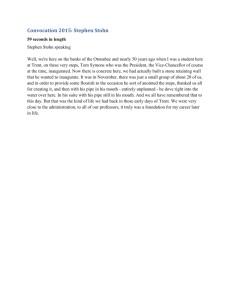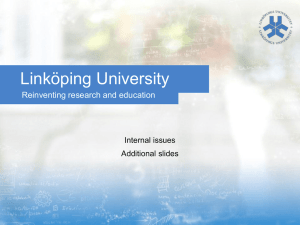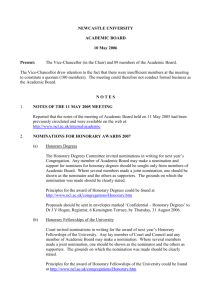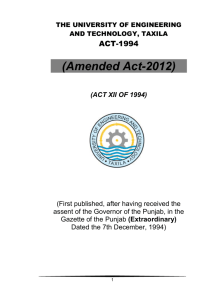Further Particulars HRG158
advertisement
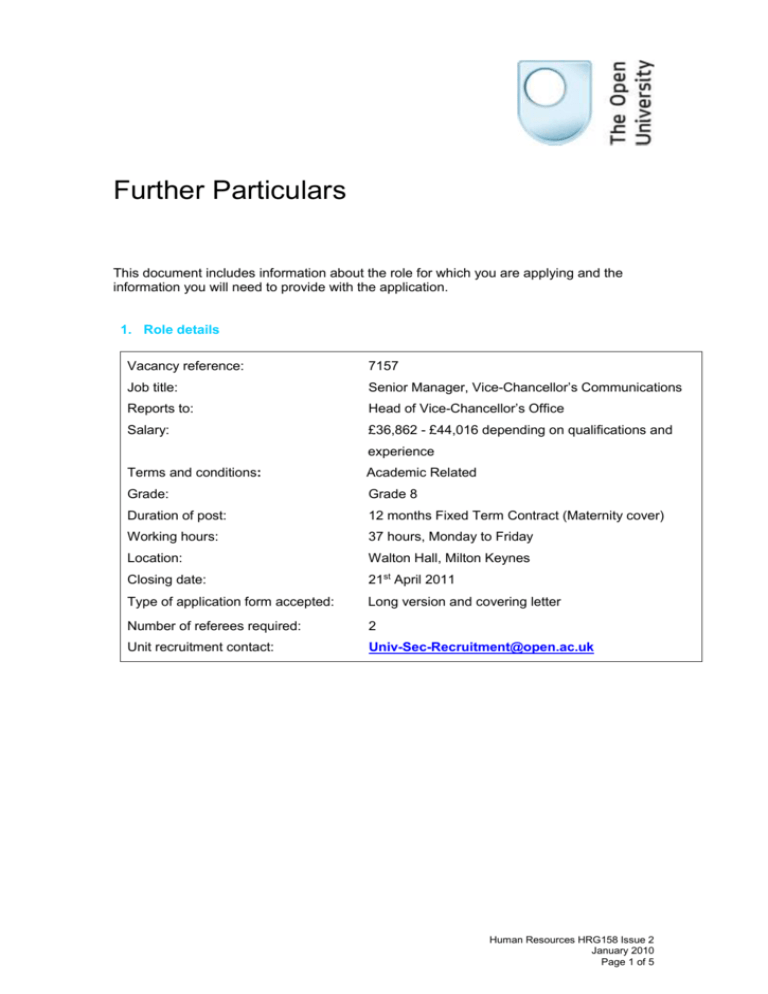
Further Particulars This document includes information about the role for which you are applying and the information you will need to provide with the application. 1. Role details Vacancy reference: 7157 Job title: Senior Manager, Vice-Chancellor’s Communications Reports to: Head of Vice-Chancellor’s Office Salary: £36,862 - £44,016 depending on qualifications and experience Terms and conditions: Academic Related Grade: Grade 8 Duration of post: 12 months Fixed Term Contract (Maternity cover) Working hours: 37 hours, Monday to Friday Location: Walton Hall, Milton Keynes Closing date: 21st April 2011 Type of application form accepted: Long version and covering letter Number of referees required: 2 Unit recruitment contact: Univ-Sec-Recruitment@open.ac.uk Human Resources HRG158 Issue 2 January 2010 Page 1 of 5 2. Summary of duties ROLE SUMMARY The primary role of this position is to initiate, formulate and execute against a comprehensive Communications Strategy and Plan which will enable the Vice-Chancellor to communicate effectively and expeditiously with a broad range of internal and external stakeholders. This role provides an excellent opportunity to gain a broad understanding of how a complex organisation operates at executive level. In fulfilling all aspects of this role, the successful candidate will be required to: Demonstrate a nuanced understanding of the strategic priorities of the OU and the objectives of the Vice-Chancellor and his Executive; Demonstrate a detailed grasp of the main issues pre-occupying the Vice-Chancellor’s Office; Understand and respond appropriately to matters which are highly confidential: to know when and how sensitive and confidential information can and cannot be communicated. MAIN DUTIES Vice-Chancellor’s Communications 1. To initiate, plan, organise and deliver vehicles for the Vice-Chancellor to communicate effectively with both OU staff and external audiences. This will include formal communication to the governance bodies of The Open University, including the ViceChancellor’s quarterly reports to Council and Senate. 2. To ensure a professional service is provided to the VC in preparing well-written, wellresearched and evidence-based speeches and written work on time and to specification. An ability to translate the VC’s thoughts and direction of travel into succinct, well-illustrated and impactful speeches pitched at the right level for the audience and the occasion is critical. 3. To undertake thorough research to ensure major conferences, high profile events, conferences etc are built in to the overall planning of the VC’s commitments throughout the year and to alert him to any conferences (either UK or international) that would provide good opportunities to increase the OU’s profile. 4. To liaise with the Head of Media Relations to manage and maximize the VC’s media activity and profile and enhance the corporate profile of The Open University. To anticipate, identify and resolve problems which could potentially involve high reputational risk for the University and assist with initiating creative solutions. This work will often require working within tight time constraints. 5. To be responsible for the Vice-Chancellor’s internal and external websites, and any others that may be required in the future. To generate sophisticated content, ensuring topicality, relevance and strategic thrust. To convey complex information in an accessible way to diverse audiences. To direct and ensure the maintenance of the sites. 6. With Communications, to be responsible for the production of the VC’s Annual Report: requesting contributions from quarters across the University, editing of entries, working Human Resources HRG158 Issue 2 January 2010 Page 2 of 5 with Communications Group and Design on layout and format, organisation of printing and circulation. 7. To identify gaps in process/communication between the Vice-Chancellor and the staff of The Open University and suggest ways of improvement to ensure the mutual exchange of information. To implement and maintain such processes ie regular meetings, briefing sessions, email circulations. 8. To assist with ensuring the effective communication of complex and sometimes politically sensitive information between the VC’s Office and the University Secretary, pro-VCs, Government Relations, Communications, the Development Office, Faculties etc. 9. To be responsible for ensuring the consistency and quality of communications from the VC’s office to maintain and enhance the University’s reputation. 10. To evaluate and monitor the VC’s communications activities to inform a review and revision of the overall strategy. Communications Service to the Chancellor, Pro-Chancellor and Vice-Chair of Council 11. To provide a communications service to the University’s Chancellor, Pro-Chancellor and Vice-Chair of Council, and other senior University figures to maximise their role within, and contribution to, the University, and as required by the Vice-Chancellor. 12. To keep the Chancellor, Pro-Chancellor and Vice-Chair of Council informed of relevant briefings and communications from and about the University on events, meetings and activities as appropriate, drafting written work as required, and liaising with external contacts to research and provide University information for speeches and other publications. Donor Management 13. To represent the VC’s Office in liaising with the Director of Development regarding potential major donors and agreeing visits to prospective donors. 14. To work with staff from the Development Office to arrange appropriate occasions for the VC to entertain or visit potential donors from companies, Trusts and Foundations. Other 15. To establish and maintain a current knowledge of the University and the HE Sector generally, through research and reading. To identify and maintain the information and statistics regularly used by the Vice-Chancellor. 3. Person specification 1. A graduate (or equivalent) 2. An excellent communicator (written and oral) with the ability to build strong working relationships at all levels internally and externally Human Resources HRG158 Issue 2 January 2010 Page 3 of 5 3. Experience of preparing well-written, well-researched and evidence-based speeches 4. Well- developed writing skills, with the ability to communicate complex information clearly, and in a style appropriate to the intended audience 5. Advanced skills in MS PowerPoint 6. Professionalism, trustworthiness, tact and diplomacy 7. Proven track record in Higher Education 8. Ability to work under pressure and balance competing priorities 9. Experience of operating effectively at a senior level 10. A pro-active and innovative individual capable of a high level of independent working but with excellent team working abilities Note: Essential elements are those, without which, a candidate would not be able to do the job. Applicants who have not clearly demonstrated in their application that they possess the essential elements will normally be rejected at the short listing stage. Desirable elements are those which it would be useful for the post holder to possess. 4. Role specific requirements e.g. Shift working 5. About the unit/department About the Vice-Chancellor’s Role The Vice-Chancellor plays a vital role in the University. He is the chief academic and administrative officer of the University, with responsibility for maintaining and promoting the integrity of the University's degree, diploma and certificate offerings as well as the efficiency of the University in general. The Vice-Chancellor leads the institution on a day-to-day basis, chairs senior University committees and takes overall responsibility for all operations of the University. The role is a strategic one, and he provides leadership to the University as it meets the challenges of the 21st century. About the Vice-Chancellor’s Office The office is comprised of a team of five people: Head of the Vice-Chancellor’s Office, Senior Manager, Vice-Chancellor’s Communications, Executive Assistant and two Office Coordinators. The team provides a complete professional, administrative, logistical support service to the Vice-Chancellor to enable him to perform his role as effectively as possible. This includes managing the Vice-Chancellor’s diary, travel arrangements and event organisation and delivery. The office communicates and liaises with external and internal stakeholders including government departments, funding bodies, major donors and foundations, other higher education institutions and sector bodies, both nationally and internationally and at the highest levels. Human Resources HRG158 Issue 2 January 2010 Page 4 of 5 6. How to obtain more information about the role or application process If you would like to discuss the particulars of this role before making an application please contact Sheila King on 01908 858055 or email S.M.King@open.ac.uk If you have any questions regarding the application process please contact Univ-SecRecruitment@open.ac.uk 7. The application process and where to send completed applications Please ensure that your application reaches the University by: 21st April 2011 noon. You should enclose: A covering letter, clearly indicating how you believe you meet the person specification. Please ensure you provide relevant examples as evidence to support your statement on no more than two sides of A4 Your completed application form (long version) Post it to: Name/Job title: Mrs Diana Griffiths, Recruitment Co-ordinator Department/Unit: University Secretary’s Office Address: Room 202, Charles Pinfold Building The Open University Walton Hall Milton Keynes Post Code: MK7 6AA Or e-mail your application to: Univ-Sec-Recruitment@open.ac.uk 8. Selection process and date of interview The interview panel will be chaired by Dr Sheila King. The Interviews will take place in May 2011. We will let you know as soon as possible after the closing date whether you have been shortlisted for interview. Further details on the selection process will also be sent to shortlisted candidates. Applications received after the closing date will not be accepted. Human Resources HRG158 Issue 2 January 2010 Page 5 of 5
